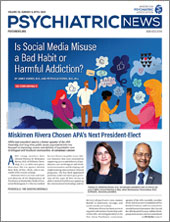State of Practice: Our Future Is at Stake

While we are living in a time of exciting scientific developments and opportunities that have led or will lead to more effective treatments, it is also paradoxically a time of increased unhappiness for many physicians. Unfortunately, there is much to complain about regarding the practice of medicine today.
Those of us who entered psychiatry were motivated by altruism and the desire to help other people; we did not choose a career that limited in-person contact or involved sitting at a computer for long periods each day. However, we now find ourselves in exactly that position—we are spending many hours typing on a keyboard to document patient care in electronic medical records (EMRs).
The government gave at least $27 billion to hospitals and providers to incentivize the adoption of EMRs. They were promoted as a tool for improving the quality and efficiency of care, but so far they have fallen well short of those goals. I find EMRs make it easier to retrieve test results, order and monitor the medications that patients are prescribed, and view notes or electronically communicate with other physicians. But one of the major justifications for hospital systems and practices to purchase these hugely expensive systems was to improve the documentation of care to increase billing revenue.
The use of EMRs has been especially harmful in psychiatry, where the pressure to increase productivity encourages psychiatrists to document sessions synchronously or, as often occurs, during free time or at home in the evening. I have been especially vocal about the importance of improving access to care. I fear that the time spent on less relevant documentation in the current generation of EMRs may actually limit productivity while increasing revenues. And remember, the experts thought EMRs would reduce health care costs by reducing unnecessary or duplicative care and procedures by improving communication about patient data.
Moreover, EMRs were intended to enhance quality performance by capturing documentation of quality measures; however, these are often unrelated to the reason the patient is seeing the physician. As reimbursement is increased by the ability to report these metrics, the physician, physician assistant, or nurse practitioner is often the one to ensure these data are captured.
It does not take long before the subject of relative value units (RVUs) comes up in conversations with colleagues who work in medical settings that have undergone industrialization. Perhaps it was inevitable, like the replacement of locally owned retail stores by such Goliaths as Walmart and Amazon. But at what cost? Not only have EMRs had the effect of taking time away from patient care, but also they are a major contributor to physicians’ feeling burned out and experiencing professional dissatisfaction. Many feel frustrated about the burdensome, often immaterial documentation they must provide that fails to lead to improved quality of care.
By spending less time listening to patients during our very limited time with them and increasing the administrative load that psychiatrists already carry, we are putting the future of our profession at risk. I’ve not given up on the hope that EMRs may one day enhance the quality of care, but we’ve got a long way to go. ■



